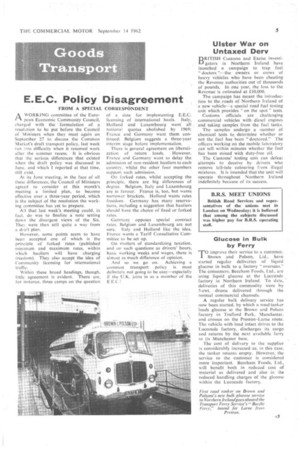E.E.C. Policy Disagreement
Page 7

If you've noticed an error in this article please click here to report it so we can fix it.
FROM A SPECIAL CORRESPONDENT
AWORKING committee of the European Economic Community Council, charged with the formulation of a resolution to be put before the Council of Ministers when they meet again on September 27 to discuss the Common Market's draft transport policy, last week ran into difficulty when it resumed work after the summer recess. It is obvious that the serious differences that existed when the draft policy was discussed in June. and which I reported at that time, still exist.
Al its June meeting, in the face of all these differences, the Council of Ministers agreed to consider at this month's meeting a limited plan, to become effective over a three-year period, which is the subject of the resolution the working committee has yet to prepare. All that last week's meeting could, in fact, do was to finalize a note setting down the divergent views of the Six. They were then still quite a way from a draft plan. However, some points seem to have been accepted one of which is the principle of forked rates (published minimum and maximum rates, within which hauliers will have charging freedom). They also accept the idea of Community licensing for international traffic.
Within these broad headings, though, little agreement is evident. There are, for instance, three camps on the question
• of a date for implementing E.E.C. licensing of international hauls. Italy, Holland and Luxembourg want all national quotas abolished by 1969 France and Germany want them continued; Belgium suggests a three-year interim stage before implementation. . There is general agreement on liberalization of return loads. However, France and Germany want to delay the admission of non-resident hauliers to each country, whilst the other four members support such admission. On forked rates, whilst accepting the principle, there are big differences of degree. Belgium, Italy and Luxembourg are in favour. France is, too, but wants narrower brackets. • Holland wants rates freedom. Germany has many reservations, including a suggestion that hauliers should have the choice of fixed or forked rates.
Germany opposes special contract rates. Belgium and Luxembourg are not sure. Italy and Holland like the idea. France wants a Tariff Consultative Committee to be set up. On matters of standardizing taxation, and on such questions as drivers' hours, basic working weeks and wages, there is
• almost as much difference of opinion. And so we go on. Achieving a common transport policy is most definitely not going to be easy—especially if the U.K. joins in as a member of the E.E.C.!
















































































































































































































































